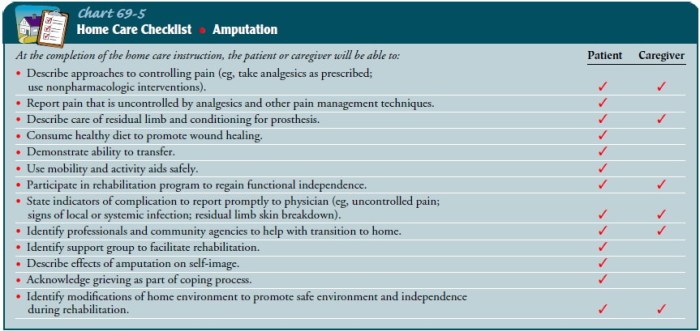Nursing care plan for amputation – Nursing care plans for amputation provide a comprehensive framework for managing the unique needs of patients who have undergone amputation surgery. These plans address the physical, psychological, and social challenges associated with amputation, aiming to optimize patient outcomes and enhance their quality of life.
This guide delves into the essential components of nursing care plans for amputation, including assessment, planning, implementation, evaluation, and special considerations. It also explores ethical considerations related to amputation care, ensuring that patients’ rights and autonomy are respected throughout the care process.
Nursing Care Plan for Amputation

Nursing care plans for amputation provide a structured framework to guide the provision of individualized and comprehensive care for patients undergoing amputation surgery. These plans address the unique physical, psychological, and social challenges faced by amputation patients and aim to promote optimal outcomes and enhance quality of life.
1. Nursing Care Plan Overview, Nursing care plan for amputation
Nursing care plans for amputation are essential for:
- Identifying and addressing the specific needs of amputation patients
- Setting realistic goals and interventions
- Monitoring patient progress and evaluating the effectiveness of care
Common nursing diagnoses related to amputation include:
- Impaired physical mobility
- Acute pain
- Risk for infection
- Body image disturbance
- Anxiety and depression
2. Assessment
A comprehensive assessment is crucial before developing a care plan for amputation. This includes:
- Physical assessment:Evaluating the surgical site, wound status, range of motion, and pain levels
- Psychological assessment:Assessing emotional well-being, coping mechanisms, and support systems
- Social assessment:Identifying social resources, home environment, and occupational status
Pain assessment is particularly important, and nurses should use validated pain assessment tools to accurately measure pain intensity and guide appropriate interventions.
3. Planning
Care plans are developed in collaboration with the patient, interdisciplinary team, and significant others. They include:
- Goals:Specific, measurable, achievable, relevant, and time-bound objectives
- Interventions:Nursing actions to achieve the goals
- Evaluation criteria:Indicators used to measure progress towards goals
Interdisciplinary collaboration is essential to ensure a comprehensive approach to care.
FAQ Explained: Nursing Care Plan For Amputation
What is the purpose of a nursing care plan for amputation?
A nursing care plan for amputation provides a structured framework for assessing, planning, implementing, and evaluating the care of patients who have undergone amputation surgery. It ensures that patients receive individualized and comprehensive care that addresses their physical, psychological, and social needs.
What are the common nursing diagnoses related to amputation?
Common nursing diagnoses related to amputation include:
- Acute pain
- Impaired physical mobility
- Body image disturbance
- Risk for infection
- Social isolation
What are the unique nursing considerations for different types of amputations?
Different types of amputations, such as upper extremity, lower extremity, and traumatic amputations, present unique nursing considerations. Nurses must understand the specific challenges and adaptations required for each type of amputation, such as wound care, pain management, and rehabilitation strategies.
What are the ethical considerations related to amputation care?
Ethical considerations in amputation care include informed consent, patient autonomy, and end-of-life care. Nurses play a vital role in advocating for the patient’s rights, ensuring ethical decision-making, and addressing ethical dilemmas that may arise.
